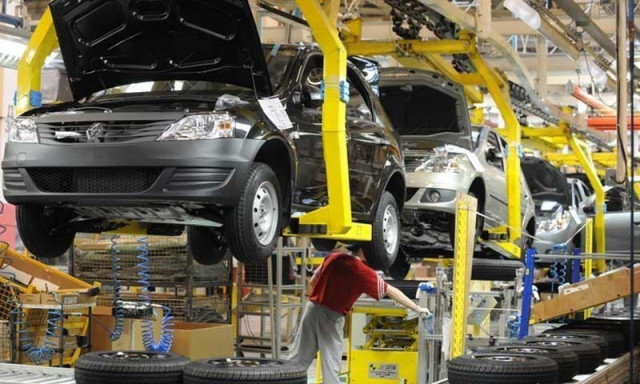Auto sector seeks scrappage policy
Industry players label policy imperative for growth of sector

Following an official announcement in India about the new vehicle scrappage policy to tackle the issue of air pollution, Pakistan’s auto sector has also demanded an auto scrap policy.
Countries introduce the scrapping policy to decide the life of vehicles; how old vehicles should be to protect the environment and accelerate the auto market, said Pakistan Electric Vehicles Manufacturers Association (PEVMA) Chairman Sabir Shaikh while talking to The Express Tribune.
The Indian automobile industry has been struggling with a severe sales slowdown since 2019 - and the pandemic brought it to a screeching halt, said The Pioneer (Lucknow, India) Executive Director News Biswajeet Banerjee in comments given to The Express Tribune.
Although during the second half of the pandemic, the situation has shown slight improvement, to help the auto sector, the Indian government brought a voluntary vehicle scrapping policy, which was announced by the Finance Minister Nirmala Sitharaman during her budget speech.
The arrival of the policy is good news for the automakers.
“This policy helps the replacement of old vehicles with new ones. It will encourage vehicle owners to scrap vehicles older than 15 years and purchase new ones instead and the government also offers financial help to consumers on purchase of a new vehicle,” said the Indian Transport Minister Nitin Gadkari.
He said the major advantage of this scrappage policy is that it helps reduce air pollution by removing older and more polluting vehicles from the roads.
Developed countries have set the limit of vehicle age to six to eight years, however, we are a poor country we can give 15 to 20 years but there must be a scrapping policy, said Shaikh.
Another way to discourage those in developed countries is to make license for old cars expensive, said Pakistan Association of Automotive Parts and Accessories Manufacturers (PAAPAM) former chairman Mashood Ali khan. “But for this, the government will need to give low-interest rate for car financing otherwise this law alone will not help.”
As part of the Indian policy, customers scrapping their old and polluting vehicles will be provided with an incentive to buy a new vehicle. There is also a possibility that a loan-based incentive could be on the table.
Although the details of the scrapping policy will be announced by the minister of transport, Indian businessmen are happy with the policy.
“This policy bodes well for the auto sector,” said Uttar Pradesh Adarsh Vyapar Mandal President Sanjay Gupta.
The traders’ body chief added, “The vehicle scrappage policy was one of the key demands of the auto industry to battle the sales slowdown that set in 2019 and worsened last year because of the pandemic.”
“Scrap policy will also dampen incentive of car theft of new vehicle parts which are used in an old vehicle to disguise and avoid the attention of authorities,” said Shaikh. “Every year new technology emerges and companies stop producing parts of old vehicles this is how costumers in Pakistan can benefit from new technology.”
“We have been struggling with the auto scrap policy for about two decades as it is imperative for the progress of our auto sector,” emphasised the former PAPAAM chairman. “We suggest the government of Pakistan to introduce a comprehensive auto scrap policy under which auto vehicles older than 15 years should be transported to rural areas and should not be allowed on the roads of big cities.”
“This way both cities and rural areas will benefit from the policy,” he added.
Published in The Express Tribune, February 14th, 2021.
Like Business on Facebook, follow @TribuneBiz on Twitter to stay informed and join in the conversation.


















COMMENTS
Comments are moderated and generally will be posted if they are on-topic and not abusive.
For more information, please see our Comments FAQ